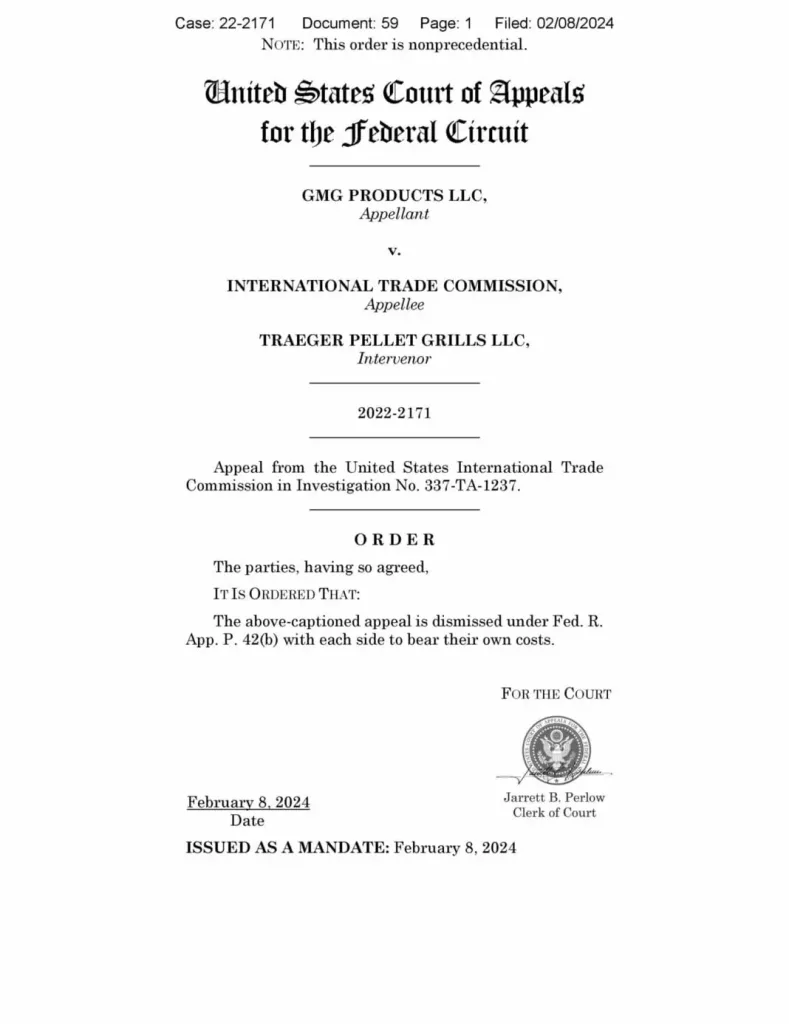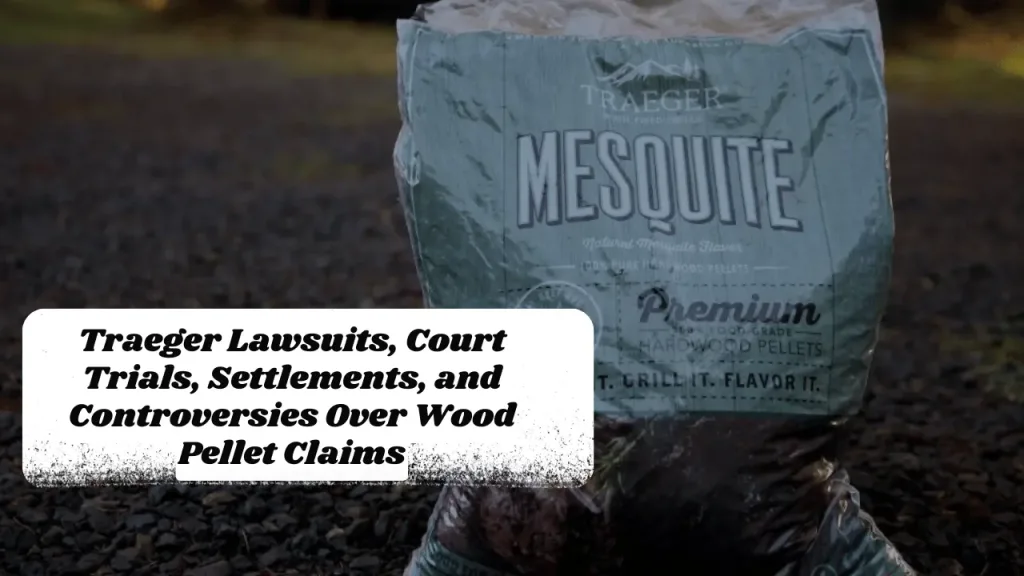Traeger Lawsuits, Court Trials, Settlements, and Controversies Over Wood Pellet Claims
Traeger Pellet Grills, a famous name in the grilling industry, is facing mounting legal challenges that have raised questions about its products and business practices. The company has been at the focal point of multiple lawsuits, including high-profile claims about misleading wood pellet contents and patent infringement. In one notable case, Traeger agreed to settle a $1.5 million lawsuit over its pellet ingredients, further fueling the controversy. As the company navigates these legal battles, the outcomes could significantly impact its reputation and operations. This article provides an in-depth look at the major lawsuits, settlements, and controversies that have shaped Traeger’s legal landscape in recent years.
Table of Contents
Traeger’s History and the Wood Pellet Controversy
Traeger Pellet Grills was founded in 1985 by Joe Traeger in Mt. Angel, Oregon. The company revolutionized grilling by developing the first wood pellet grill, which combined the convenience of an electric smoker with the flavor benefits of wood chips. The innovation quickly gained popularity, and Traeger became a household name in outdoor cooking. In 2006, the Traeger family sold the company to a private equity firm for $12.4 million, and by 2014, it was acquired by Jeremy Andrus and the private equity firm Trilantic Capital Partners. Despite these ownership changes, the company continued to operate under the Traeger name, moving its headquarters to Salt Lake City, Utah, in 2015.

However, it was not all smooth sailing for Traeger, especially when a lawsuit filed in 2019 brought to light significant allegations against the company. The lawsuit, initiated by Michael Yates of California, accused Traeger of deceiving consumers by not using the type of wood advertised on its pellet bags. The plaintiffs argued that the pellets, labeled as containing mesquite, hickory, and other types of wood, were actually made from cheaper woods, flavored with oils to mimic the advertised flavors. Yates contended that the practice allowed Traeger to charge higher prices for pellets that were worth less, causing financial harm to customers.
The case drew attention, especially after it was revealed that the pellets sold by Traeger often contained less than one-third of the advertised types of wood, with oak and alder being particularly underrepresented. Despite denying the allegations, Traeger agreed to settle the lawsuit for $1.5 million in 2023, with customers in California and Utah receiving $3 coupons for future pellet purchases. The settlement also required Traeger to revise its pellet packaging, removing misleading claims about the types of wood used.
Legal Conflicts with Competitors The Traeger vs. Dansons Lawsuit
While the wood pellet case was ongoing, Traeger found itself embroiled in another legal dispute, this time with rival grill manufacturer Dansons. The two companies fought a bitter legal dispute over patent infringement and advertising practices. Traeger accused Dansons of copying its pellet grill designs and using the Traeger brand and family in their advertising materials without permission. The lawsuit, filed in 2019, also alleged that Dansons had hired former Traeger employees and used their knowledge of the company’s proprietary designs.
In a related case, Dansons also came under fire for using the Traeger barn and images of Joe Traeger in its promotional campaigns. In December 2019, the two companies reached a settlement, which included an agreement that Dansons would stop using the Traeger family in its marketing efforts. The settlement in this case was reached in June 2020, with both parties agreeing to bear their own legal costs. Although no financial terms were disclosed, the settlement marked the end of a long-standing rivalry between the two companies.
A Different Kind of Dispute, Patent Infringement with Green Mountain Grills
In addition to the legal issues regarding its wood pellet claims and competition with Dansons, Traeger also faced a patent infringement lawsuit with Green Mountain Grills (GMG). This case, which revolved around Wi-Fi-connected pellet grills, was another major legal challenge for the company. Traeger claimed that GMG had infringed on its patents related to connected grilling technology. The case spanned several years and involved multiple appeals, but in February 2024, the dispute was finally resolved with a settlement. Both parties agreed to drop the appeal, signaling the end of their legal affair.
While the specific terms of the settlement were not disclosed, the case highlights the increasing role of technology in the outdoor grilling industry, with Wi-Fi-connected grills becoming a popular feature in many modern models. The resolution of the Traeger vs. GMG lawsuit marked the conclusion of a significant chapter in Traeger’s history, which had been defined by innovation and legal disputes alike.

FAQs
What is a wood pellet grill, and how does it work?
A wood pellet grill uses compressed wood pellets as fuel, which are heated to create smoke for grilling food. These grills are known for providing a unique smoky flavor to the food while being easier to use than traditional wood or charcoal grills. The pellets are automatically fed into the grill by an auger, making them more convenient for users.
Why did Traeger Pellet Grills face lawsuits over its wood pellets?
Traeger faced lawsuits because consumers alleged that the wood pellets sold by the company did not contain the type of wood advertised. For example, some pellets labeled as mesquite or hickory were said to contain primarily cheaper woods like alder and oak, flavored with oils to mimic the advertised woods. This led to accusations of false advertising and consumer deception.
How did Traeger settle the wood pellet lawsuit?
In 2023, Traeger agreed to a $1.5 million settlement for the lawsuit filed by Michael Yates, which claimed the company misrepresented the types of wood in its pellets. Customers in California and Utah were given $3 coupons for future pellet purchases, and Traeger agreed to revise its packaging to clarify the actual contents of its pellets.
What was the outcome of the Traeger vs. Dansons lawsuit?
In 2020, Traeger and Dansons reached a settlement in a lawsuit involving allegations of patent infringement and unauthorized use of the Traeger brand in marketing. Dansons agreed to stop using images of the Traeger family and barn in its advertisements, and both parties agreed to bear their own legal costs.
Did Traeger’s legal disputes with Green Mountain Grills impact the company significantly?
The patent infringement lawsuit with Green Mountain Grills was another key legal issue for Traeger. However, after years of litigation, the case was settled in 2024, with both parties agreeing to drop the appeal. While the lawsuit highlighted the importance of technology in grilling products, it did not significantly harm Traeger’s market position, as the company remained a leader in the pellet grill industry.
What changes did Traeger make to its pellet bags as a result of the lawsuit?
Following the lawsuit over its wood pellets, Traeger changed the labeling on its bags to remove misleading phrases like “100% foodservice hardwood pellets” and replaced them with more accurate descriptions such as “natural flavored hardwood” to ensure greater transparency.
Why was Traeger’s lawsuit over wood pellets dismissed in 2020?
In May 2020, U.S. District Court Judge Bruce Jenkins dismissed the proposed class action lawsuit against Traeger over the wood pellet claims. The judge ruled that the plaintiffs had not established that the court had jurisdiction over the case, and it was considered premature to present the class action without certification.
What is the significance of Traeger’s $605.9 million revenue in 2023?
Traeger’s revenue figures show the company’s continued success in the pellet grill market, despite facing legal challenges. With $605.9 million in revenue, including $114.9 million from consumables like wood pellets, rubs, and sauces, Traeger remains a dominant force in the industry.
Conclusion
Traeger Pellet Grills has experienced a complex legal market in recent years, facing a range of lawsuits that have tested its business practices, its relationships with competitors, and its commitment to delivering quality products. The wood pellet lawsuits and the patent disputes with Dansons and Green Mountain Grills have significantly impacted the company’s reputation, but they have also led to important settlements and changes in how Traeger operates.
Despite these challenges, Traeger continues to be a leader in the pellet grill industry, boasting impressive revenues and a dedicated customer base. As the company moves forward, it will undoubtedly face new legal hurdles, but it seems poised to adapt and thrive in a competitive market, driven by innovation and a commitment to quality.
About the Author

Sarah Klein, JD, is a licensed attorney and legal content strategist with over 12 years of experience across civil, criminal, family, and regulatory law. At All About Lawyer, she covers a wide range of legal topics — from high-profile lawsuits and courtroom stories to state traffic laws and everyday legal questions — all with a focus on accuracy, clarity, and public understanding.
Her writing blends real legal insight with plain-English explanations, helping readers stay informed and legally aware.
Read more about Sarah
